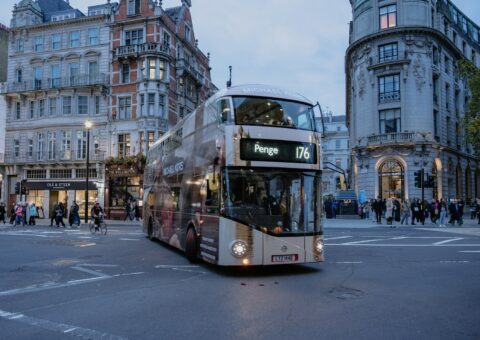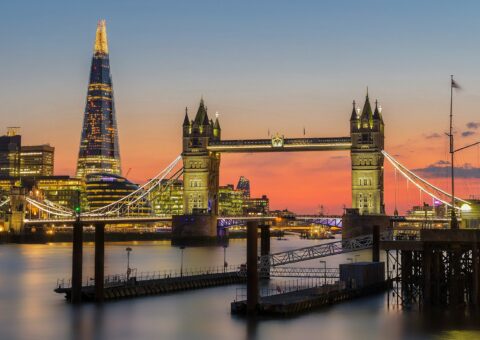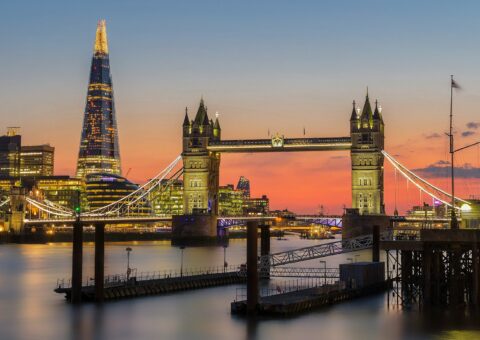Moving to London: Important Things to Know
Coming up: furry friends, renting hacks, vast numbers of visas, useful ways to save money, how to find a perfect place to live, and things you didn’t know about moving to London.
So you’re planning on moving to London.
Good choice!
(because some of the staff here at Homelike have lived in London, we know it’s a great place to move… and we know how to settle into the city comfortably and quickly)
For loads of reasons, relocating to London is a popular choice. It’s massive, it’s one of the world’s most multicultural places, you could spend the rest of your life in the city without getting bored, and the amenities and opportunities are some of the best on the planet.
But which district is best for you? How much money will you spend? What exactly is council tax? Which websites can help you find a place to live? And exactly how many hypothetical questions can one introduction ask?
Coming up, all that and more: today, Homelike are bringing you everything you need to know about moving to London. Pack your passport and come join the fun!
Why choose London?
We’ve already unpacked the perks and pros of moving to London in our big guide for expats in London.
… but to sum them up:
- London is one of the most multicultural places on the planet (more than 300 languages are spoken in the city, and around a third of its residents were born outside the UK)
- It measures in at a massive 600 square miles (that’s 15,000 square kilometers, and twice the size of New York!)… so you’ll always find something to do
- The native language is English… so since you’re reading this guide, you’ll be able to communicate with everyone
- You get world-class levels of education, healthcare, public transport, job opportunities, shopping, and all other amenities and conveniences
- It’s one of the planet’s best cities for nightlife, food, cafes, and bars (in London, you’ll find around 15,000 restaurants, and around 3,500 pubs)
In short, moving to London means you’re moving to one of the most impressive and action-packed cities on the planet. And because people from around the world live here, you’ll always feel welcome, and you’ll easily find a community.
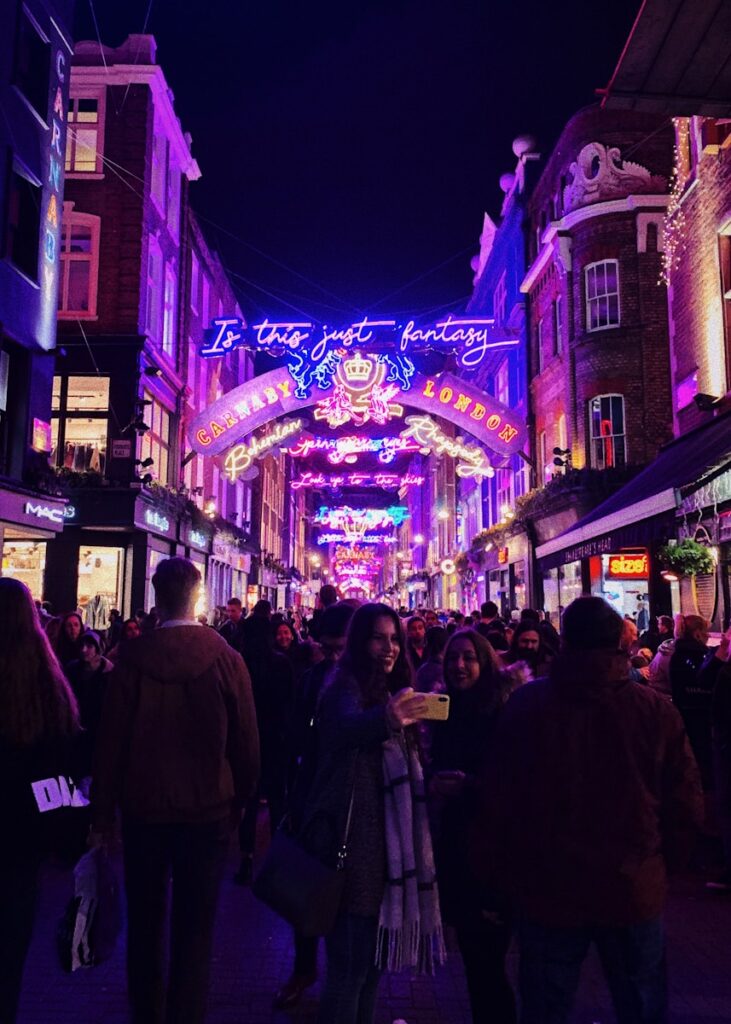
Preparing for moving to London
Before moving to London, you’ll have to check whether you need a visa.
(spoiler alert: for long stays, you will).
UK visas are particularly tough to obtain. UK immigration standards are very strict, you need to go through a whole load of bureaucracy to get one, and the UK announced harsher immigration rules at the end of 2023. That said, with the right patience, persistence and skill sets, it’s still possible to get a visa: a good place to start gathering information is the official UK visa portal.
To sum up the above link, there are many types of UK visas…
…. for work, study, business, seeking asylum, joining family, and more. And if you’re applying for a work visa, there might be specific options depending on your industry (including options for entrepreneurs, skilled workers, and even ‘high potential individuals’).
If you’ll only be sticking around for a short while, good news: some nationalities can stay in the UK for up to 6 months without a visa. They include, for example, people from the USA, Canada, Australia, Japan, UAE, and Schengen countries. But, important note: during this time, you cannot “do paid or unpaid work for a UK company.”
All that said, if your country is featured on this list, you’ll need a visa no matter how long you plan to be in the UK. And if you’re moving for work, you’ll usually need a job or a job offer before you make the move.
Before moving to London, you’ll also need to understand how UK taxes work (here’s a good place to begin), and start hunting for a London apartment.
Finding the right neighborhood after relocating to London
London is made up of almost 50 different districts—and some are VERY different from others.
… so it’s important to choose the right neighborhood.
If you’re moving to London with family, we recommend:
- Richmond: sitting outside the choas of the city center, super-green Richmond offers a big park, a village-in-a-city vibe, excellent family homes, and even some wild deer!
- Battersea: central enough to be busy and trendy, and just outskirty enough to be great for young families. Expect riverside stretches, a wide range of big and small homes, a children’s zoo, and western-London perks without the typical western-London prices.
- Kensington: one of the priciest parts of the city, you get safe streets, massive homes, excellent schools, and lots of middle-class friends.
(for much more information, here’s our complete guide to moving to London with family)
If you’re a young professional relocating to London, we recommend:
- Dalston: street markets, new-build apartments, many young people, a hip vibe, and a delicate balance between fun and residential. And you’re close to many of London’s business districts.
- Fitzrovia: little and overlooked, Fitzrovia is bordered by much-more-popular neighborhoods like Soho and Camden. But it’s residential, it’s well-connected to the city, it’s popular with other young professionals, it has a village vibe, and it’s home to some big businesses and offices.
- Shoreditch: one of the most hip and happening parts of the city, Shoreditch is home to start-ups, lots of quirky places to eat and drink, frequent pop-up events, and a HUGE number of young tech professionals.
If you’re moving to London for fun, we recommend:
- Camden: eclectic, unique and unusual, tacky-but-beautiful Camden is most famous for its high-energy market and its action-packed canal. It also offers weird venues, great nightlife, wacky bohemians, lots of live music, and a proud counterculture.
- Soho: famous for cheap pubs, LGBTQIA+ venues, jazz nights and live music, Soho is an anything-goes part of the city where you can find a party every night.
- Brixton: expect Caribbean culture, hip hangouts, no-frills bars, the live music of much-loved Brixton Academy, lots of pop-up events and market stalls, and a load of young people. And it’s close to all the laid-back multicultural fun of Peckham.
If you’re only relocating to London for a little while, we recommend staying somewhere central, well-connected, and close to all the tourist attractions. Good choices would be Lambeth, Westminster, Covent Garden, Camden, and Soho.
For much more information, check out our guide to the 15 best areas in London.
Cost of living in London
As you probably already know, London is expensive.
According to Numbeo:
- London is around 20% more expensive than Berlin
- … and around 40% more expensive than Madrid
- … and around 75% more expensive than Budapest
At the time of writing, here are average utility (and transport) prices you can expect after relocating to London:
- Monthly rent for a 1-bedroom apartment in a central area: £2,100
- Monthly rent for a 1-bedroom apartment in a not-central area: £1,600
- Monthly collated cost of typical utilities (gas, water, electricity, etc) : £291
- Typical home internet package (60 Mbps or more, unlimited data): £31
- One-way public transport ticket: £2.80
- Monthly pass for public transport: £200
- 1-month gym pass: £45
… and here are the average costs you can expect from going out in London:
- Meal for one in an Inexpensive restaurant: £20
- 3-course meal for 2 people in a mid-range restaurant: £80
- One pint of domestic beer: £6.50
- Regular cappuccino in a cafe: £3.60
You can find even more numbers for moving to London here.
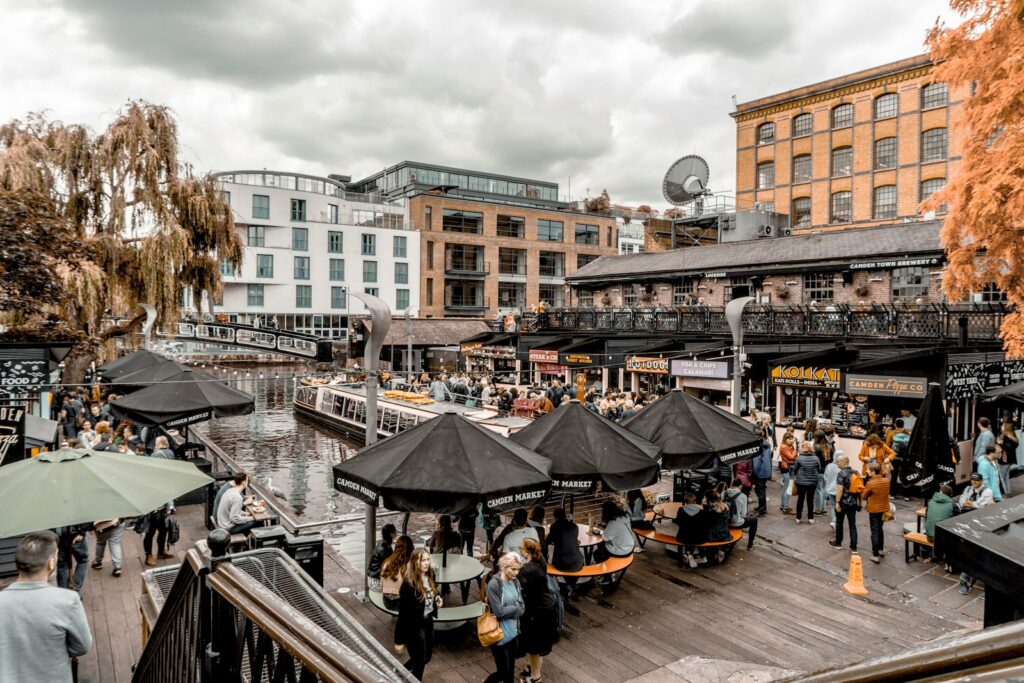
Buying vs renting in London
In the very-long-term buying a home in London is of course cheaper than renting a home in London.
As you can see here:
“In 2023, the average price of a one-bed London flat was £352,254, with an associated mortgage payment of £1,524 per month. However, tenants renting a one-bed flat in the capital pay an average of £1,767 per month”
So, in general, the average person (in average circumstances) can save over £200 per month by buying a home in London instead of renting a home in London. And, of course, if you’re buying a home, you’re making a good long-term investment.
That said, it’s not always so simple: the UK’s homebuying bureaucracy can very complex, you have other costs to think about (like real estate fees, conveyancing fees, and the so-called ‘Stamp Duty’), and you probably don’t yet know if you want to spend THE REST OF YOUR LIFE in London.
… so in the short-term, we absolutely recommend renting. Then if you like life in London (and when you’ve found a neighborhood you really love), you can consider buying what might become your forever home.
How to find a short-term rental in London
It can be very difficult to find a place to live in London.
(or at least, to find a well-priced nice place in London)
But here are some top tips:
- Of course, you can use Booking or Airbnb
- Other newcomers use Facebook, although landlords there often charge high prices for bad places (but you can find good places with enough patience). Hop onto the site, go to the search bar, and type terms like ‘apartments London,’ ‘rentals London’ and ‘flats in London.’
- Websites like SpareRoom can be useful for finding a house share with an empty bedroom (good for saving money and making friends, not so good for having privacy and feeling like a real-life adult)
- If you want to rent an unfurnished place in the ‘normal’ way, the check out Zoopla and RightMove. But real estate agents usually want you to visit these homes in-person, and the photos often don’t represent what the places actually look like.
- But, overall, we recommend using Homelike (yep, that’s us!) for short term rentals in London. Because for a whole load of reasons, we make relocating to London a whole lot easier. And isn’t that exactly why you’re reading this guide? 😉
How to find a long-term rental in London
If you’re not yet in the city, finding a long-term rental in London brings the same problems as finding a short-term rental in London.
So here’s what we recommend: find a short-term rental for three months or so…
… and while you’re in that short-term place, you have a good base for viewing and exploring all your long-term options*.
*By the time those three months have passed, you’ll know London better, you’ll have more contacts in the city, and you’ll understand its culture and bureaucracy. So you’ll have a much higher chance of finding a place you really love (instead of being stuck in a miserable home with a 2-year contract).
And when you find a place you love, relocating to London will be a lot more enjoyable.
Finding a long-term rental in London can be made much easier with the right resources. Start by checking out well-known real estate websites like Rightmove and Zoopla. These platforms offer comprehensive listings across various neighborhoods, complete with detailed descriptions, photos, and rental prices. Setting up email alerts for new listings that match your criteria can also help you stay on top of the latest options without constantly refreshing your browser.
At Homelike, we also have plenty of listings that are suitable long-term stays. Our platform is designed with expats, digital nomads and business travelers in mind, offering properties with flexible rental terms. Our listings come with bills included, so you can move in and start living right away without the need to set up additional services. Using Homelike makes finding a long-term rental in London a smooth and efficient experience.
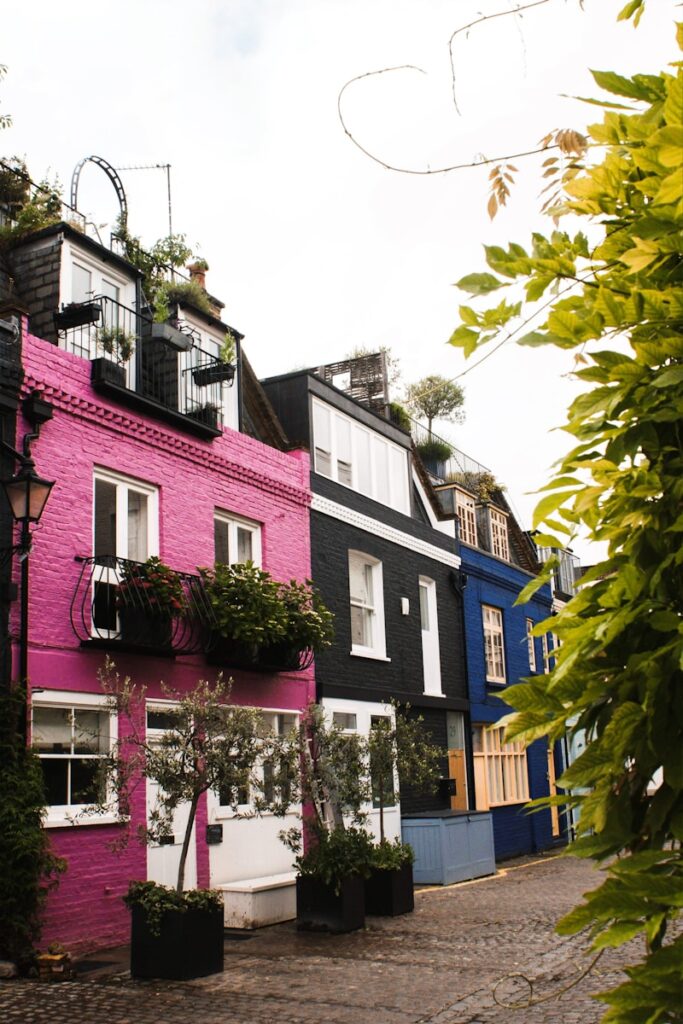
Transport in London
Public transport here is some of the best in the world.
… and after relocating to London, you’ll probably be surprised by just how good it is.
You can expect:
- 272 underground stations (or ‘tube stations,’ as locals call them)
- An underground network measuring in at more than 402 kilometers (250 miles)
- 675 bus routes (managed by more than 9,000 buses)
- Lots of overground rail services
- Pretty good cycling infrastructure
- … and trams, boats, taxis, on-the-street hire bikes, and even a cable car
Because it’s so good, you really don’t need a car in London; and the vast majority of London residents don’t have one
But if you do want to drive after relocating to London, here are some things you need to know:
- Traffic can be very bad, especially during peak hours; recently, the city was ranked as the world’s slowest. And the average commuting driver spends almost 90 minutes a day in their car.
- The city is home to a ‘ULEZ’ scheme (Ultra Low Emission Zone scheme). So if you drive a car in certain parts of the city, you need to pay a £12.50 daily charge to do so. Here’s more.
Gas is expensive, costing around £1.50 for 1 liter.
Schools and education options after moving to London
If you’re relocating to London with kids, we’ve got good news:
UK education is some of the best in the world: in a recent ‘Best Countries Report,’ the UK ranked 2nd in the world for education.
And as you can see here, ‘8 of the world’s best schools are in London.’
Because London is so big, it’s home to almost 3,000 schools: some are private, some are public (and therefore completely free), some are excellent, some aren’t so good. But if you want a wide selection of excellent schools, London is one of the best cities in the world.
London also has around 40 universities, and many of them are world-class. Many young people move to London exclusively to study: at some of London’s universities, 40% (or more) of the students are from outside the UK.
London’s healthcare system
The UK is home to the NHS (the National Health Service), a universal healthcare system paid for via taxes.
With this system, the vast majority of healthcare is free (big exceptions include prescription pills and dental care), and taxpayers have no choice but to pay into the NHS-providing system.
Although UK healthcare standards aren’t as great as they once were, they’re still pretty good: in a recent analysis, the UK ranked in the world’s top 35 for quality of healthcare. And similar previous studies have placed it much higher.
Here’s more information on how to become eligible for NHS healthcare after moving to London. But, in short, if you’re eligible for care, you can receive it immediately (to qualify, you don’t need to have been in the UK for any specific amount of time).
All that said, you can get even better healthcare (along with WAY shorter waiting times) by opting for private healthcare. Private healthcare in the UK is top class. Average payment plans for average applicants are just under £1,000 per year. To get private healthcare after relocating to London, the most popular providers are Bupa, AXA, and Aviva.
Setting up bank accounts
To make life as easy as possible, consider opening an online-only international account before moving to London. With options like Wise and Monzo, you need very little documentation, and you can set up your account even before you arrive in the UK. The process is quick, often taking just a few minutes, and you’ll have access to your account right away. These digital banks are known for their user-friendly interfaces and helpful features, making it an excellent way to manage your finances from the get-go.
Once you’ve settled in and have a fixed UK address, it might be a good idea to open a traditional bank account for paying bills and having access to a physical branch if needed. Some of the best and most popular UK banks include Halifax, Barclays, and Santander. These banks offer various types of accounts to suit different needs, and having a local account can make certain transactions easier. By combining an online-only account with a traditional one, you’ll have the flexibility and convenience to manage your finances effectively in London.
For those who prefer online banking, there are plenty of great digital banks to consider. Monzo and Revolut are popular choices, known for their user-friendly apps and low fees. These banks often allow you to set up an account entirely online, without needing to visit a branch. Some even offer features like budgeting tools and real-time spending notifications, which can be really helpful. So, whether you go with a traditional or online bank, opening an account in London is a manageable task that can help you settle into your new city.
Moving to London with pets
No one wants to leave their four-legged friends behind. Luckily the PETS Scheme makes it simple enough to bring your pets to the UK. It can be an incredibly long-winded, not to mention an expensive process to bring your pets to the UK, but it’ll be worth it to have them by your side.
Although it’s a capital city, London is GREAT for pets.
You get many animal owners and pet-friendly cafes, and around 20% of the city is made up of public parks.
We’ve covered all this in much more detail in our guide to moving to the UK with a pet…
… but in summary, if you’re relocating to London with a furry friend, you need to have it microchipped, vaccinated against rabies, and treated against tapeworms. And you need to get a pet passport. And there may be other measures depending on where you (and your pet!) are moving from.
There’s no denying that finding a pet-friendly apartment to live in once you’ve arrived in London is going to be difficult. According to a recent survey by the Dog’s Trust, 78% of pet owners have difficulty finding pet-friendly accommodation and the same can be said of London accommodation.
A pet relocation agency can come in real handy; they’ll help you with everything from filling in the right paperwork to having your pet delivered right to your door.
You’ll need to be prepared to pay a mandatory pet cleaning fee on your tenancy agreement which can cost anywhere from £100 to £200.
For more information on moving your pet to the London, read our UK pet relocation guide. You can also find pet-friendly flats in London on our website
Essential services and utilities when relocating to London
Organizing your utilities before moving to London can be complicated…
… because, if you don’t have a permanent address, you usually can’t organize your internet and gas and electricity. But after you move into a permanent address, it can take a while to get these things sorted out. So you might wind up stuck in a short utility-less limbo.
… so that’s why many newcomers choose to initially move into an already-organized short-term place (through, for example, Homelike!). With our apartments, your utilities are already organized for you, you don’t need to fret about getting your internet installed, and you don’t have to pay any council tax*.
*Council tax is another cost UK newcomers often don’t expect before moving to London. It’s a compulsory local tax that pays for council services, like waste collection, street cleaning, police, and libraries.
After you have found a long-term place in London, here’s what you need to know…
Most UK residents get their gas and electricity from British Gas, EON, or Npower. The most popular way to get the best deals is by using a comparison site like this one. Your water is almost always supplied by one regional operator—simply contact that operator to get connected and organize your payments.
When you arrive in the UK, you can get a physical SIM card at most airports—this SIM will give you a phone number, and access to data. These airport SIMs are expensive, so they’re only a good solution in the short-term. To get a long-term SIM card and phone contract, compare all your options online with Carphone Warehouse.
If your phone is compatible, you can also get an e-SIM before you arrive in the UK (you activate this e-SIM online, and don’t need to mess around with getting an actual physical card). AirAlo is the most trusted and reliable e-SIM provider, though pretty expensive.

Safety and security in London
Like any big capital city, London has a reputation for being unsafe.
… but after relocating to London, you’ll see that reputation is completely unjustified.
Yes, there is crime in the city—like pickpocketing, and mugging, and some violent crime.
But for the most part, you’ll be safe: TravelSafe has rated the city 68 on its safety index, with a ‘low’ overall risk.
After moving to London, here are some safety tips to follow:
- Be vigilant around roads: robbers often ride around on mopeds, snatching bags, phones and other belongings from unsuspecting pedestrians.
- Some parks can be a little sketchy at night: but they’re all perfectly safe during the day.
- When you’re on a night out, don’t leave drinks unattended, and don’t accept drinks from strangers.
- Watch out for pickpockets, especially on tubes, and in busy/touristy areas.
Here are more safety tips, from London’s metropolitan police.
Moving to London: final thoughts
And that’s us done: that’s everything you need to know about relocating to London!
Again, the most simple, logical and stress-free strategy is finding a short-term apartment for three months or so. And while you’re staying in that short-term place, you can simultaneously find an ideal long-term home.
(because, as we’ve covered, finding a homely good-value long-term London base before you arrive in the city is basically impossible)
… so, we recommend finding an apartment with us. All of ours are comfortable, cozy, completely furnished, great for living and working, and ready to move into today. And you don’t need to organize any bills or bureaucracy. Simple!
If you have any more questions on relocating to London, here is an article for expats in London.
Thanks for reading, thanks for choosing Homelike, and enjoy your new life in London. See ya!




